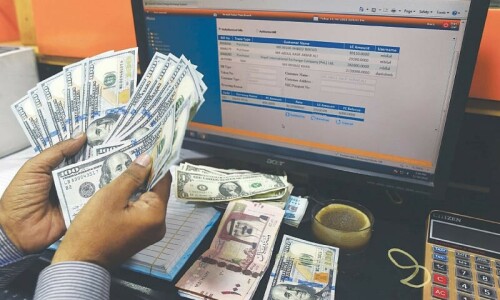KARACHI: Foreign exchange reserves of the State Bank of Pakistan (SBP) increased by $394 million during the week ended on April 14, reported the central bank on Thursday.
The SBP reserves have been showing some improvement following the inflow of a $1.3bn loan from China in three instalments in recent weeks.
Pakistan depends largely on China for commercial and non-commercial loans and currently owes the highest amount of $30bn to Beijing.
Being the biggest trade partner, China contributed more than 30pc to the overall foreign direct investment inflows Pakistan received during 9MFY23, though the balance of trade is largely on the Chinese side.
The SBP reported that its forex reserves jumped to $4.432bn with the inflow of a $300m commercial loan during the week under review. It was the second-highest level during the current calendar year after hitting $4.6bn on March 17.
However, despite assurances from Saudi Arabia and the UAE, no inflows have so far been realised from both friendly countries.
The poor foreign exchange reserves have gravely hit the exchange rate as the rupee depreciated by Rs105 against the US dollar in a year, which in return brought inflation.
Pakistan’s huge imports with costly dollars pushed the inflation to over 35pc in March. The high inflation forced the central bank to increase the interest rate to 21pc which practically crippled trading and industrial activities.
The IMF has predicted 0.5pc growth of the economy in FY23 as it had been asking SBP to increase the interest rate to tame inflation. Millions of Pakistanis have lost their jobs due to the steep economic failure.
Although the prime minister has announced that Pakistan has fulfilled all the conditions under the 9th economic review, the IMF has not yet signed a staff-level agreement to release the $1.1bn tranche.
The government is willing to arrange $6bn for debt servicing required till the end of June while over $2bn is expected to be rolled over by China.
Independent economists and analysts had been warning the government to resolve the political unrest at the earliest, which began disrupting the economic stability after former PM Imran Khan’s ouster.
Due to poor foreign exchange reserves, the government has tight control over the imports but the 9-month data showed that the trade deficit was still over $20bn. The current account deficit fell by 74pc during the first nine months of FY23 but the country needs at least $6bn to meet the deficit by the end of June.
The foreign exchange reserves of the commercial banks reached $5.5bn while the country’s
total reserves were just $9.96bn. Meanwhile, the country’s total liquid reserves stood at $10.1bn on March 17.
Published in Dawn, April 21st, 2023














































Dear visitor, the comments section is undergoing an overhaul and will return soon.